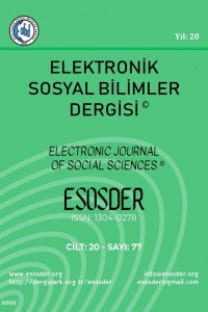ULUSLARARASI SİSTEMDE ÜLKELERİN ELLE TUTULAMAYAN RAKİP İLE MÜCADELESİ: ULUSLARARASI GÜVENLİK AÇISINDAN KÜRESEL ISINMA PROBLEMİ
Küresel ısınma, iklim değişimi, çevre sorunu
THE STRUGGLE OF COUNTRIES WITH THE INTANGIBLE CHALLENGER IN THE INTERNATIONAL SYSTEM: GLOBAL WARMING PROBLEM IN TERMS OF INTERNATIONAL SECURITY
___
- Africa | Action Against Desertification | Food and Agriculture Organization of the United Nations. (2020). FAO. http://www.fao.org/in-action/action-against-desertification/countries/africa/en/
- Bafana, B. . (2017, June 15). The High Price of Desertification: 23 Hectares of Land a Minute - World | ReliefWeb. https://reliefweb.int/report/world/high-price-desertification-23-hectares-land-minute
- Birth rate, crude (per 1,000 people) | Data. (2020, July 5). The World Bank. https://data.worldbank.org/indicator/SP.DYN.CBRT.IN
- Bonneuil, C. (2015, November). Tous responsables du dérèglement climatique ? Le Monde Diplomatique, Novembre 2015. https://www.monde-diplomatique.fr/2015/11/BONNEUIL/54139
- Brazil and the Amazon Forest - Greenpeace USA. (2020, July). Green Peace. https://www.greenpeace.org/usa/issues/brazil-and-the-amazon-forest/
- Burke, M. B., Miguel, E., Satyanath, S., Dykema, J. A., & Lobell, D. B. (2009). Warming increases the risk of civil war in Africa. Proceedings of the National Academy of Sciences of the United States of America, 106(49), 20670–20674. https://doi.org/10.1073/pnas.0907998106
- Climate at a Glance | National Centers for Environmental Information (NCEI). (2020, July 6). NOAA. https://www.ncdc.noaa.gov/cag/global/time-series/globe/land/1/5/2000-2020?trend=true&trend_base=10&begtrendyear=2000&endtrendyear=2020&filter=true&filterType=binomial
- Climate at a Glance, Global Time Series, National Centers for Environmental Information (NCEI). (2020, July 10). NOAA. https://www.ncdc.noaa.gov/cag/global/time-series/europe/land/1/5/2000-2020?trend=true&trend_base=10&begtrendyear=2000&endtrendyear=2020&filter=true&filterType=binomial
- Climate Changes in the United States 1991-2012. (2020, July 11). NASA, Earth Observatory. https://earthobservatory.nasa.gov/images/83624/climate-changes-in-the-united-states ; https://eoimages.gsfc.nasa.gov/images/imagerecords/83000/83624/temperature_nca-1991-2012_lrg.jpg
- Climate Change Impacts in the United States : Climate Trends and Regional Impacts. (2014). https://www.globalchange.gov/sites/globalchange/files/NCA3-climate-trends-regional-impacts-brochure.pdf
- Cohan, D. (2020, April 17). COVID-19 shutdowns are clearing the air, but pollution will return as economies reopen. Theconversation.Com. https://theconversation.com/covid-19-shutdowns-are-clearing-the-air-but-pollution-will-return-as-economies-reopen-134610
- Death rate, crude (per 1,000 people) | Data. (2020, July 5). The World Bank. https://data.worldbank.org/indicator/SP.DYN.CDRT.IN
- De l’eau et de l’énergie. (2005). Manière de Voir, 81(Juin-Juillet), 37.
- Garnier, D. (2007, April). Au Bangladesh, les premiers réfugiés climatiques. Le Monde Diplomatique, Avril 2007. https://www.monde-diplomatique.fr/2007/04/GARNIER/14594
- Global Temperature , NASA: Climate Change and Global Warmings. (2020, July 5). NASA. https://climate.nasa.gov/vital-signs/global-temperature/
- Green, F. J. (2019, October 30). Trump is officially withdrawing from the Paris climate agreement. That won’t change much. - The Washington Post. The Washington Post. https://www.washingtonpost.com/politics/2019/10/30/trumps-officially-withdrawing-paris-climate-agreement-that-wont-change-much/
- Helldén, U., & Tottrup, C. (2008). Regional desertification: A global synthesis. Global and Planetary Change, 64(3–4), 169–176. https://doi.org/10.1016/j.gloplacha.2008.10.006
- King, E. (Editor). (2013, April 19). Desertification Crisis Affecting 168 Countries Worldwide, Study Shows - Our World. Our World . https://ourworld.unu.edu/en/desertification-crisis-affecting-168-countries-worldwide-study-shows
- Laimé, M. (2008a), (2008, April 3). L’Europe de l’eau (1) : mobilisation durable ou balkanisation ? Les Blogs Du Monde Diplomatique . https://blog.mondediplo.net/2008-04-03-L-Europe-de-l-eau-1-mobilisation-durable-ou
- Laimé, M. (2008b), (2008, April 12). L’Europe de l’eau (2) : faire face au changement climatique. Les Blogs du Monde Diplomatique. https://blog.mondediplo.net/2008-04-12-L-Europe-de-l-eau-2-faire-face-au-changement
- Laimé, M. (2008c), (2008, April 21). L’Europe de l’eau (3) : la fuite en avant ? Les Blogs du Monde Diplomatique. https://blog.mondediplo.net/2008-04-21-L-Europe-de-l-eau-3-la-fuite-en-avant
- Laimé, M. (2008d), (2008, April 30). L’Europe de l’eau (4) : quel avenir pour le service public ? Les Blogs Du Monde Diplomatique. https://blog.mondediplo.net/2008-04-30-L-Europe-de-l-eau-4-quel-avenir-pour-le-service
- Marin, C. (2017, July). Niveaux extrêmes de pollution en Chine. Le Monde Diplomatique, Juillet 2017. https://www.monde-diplomatique.fr/cartes/pollution-chine
- Martin, E. (2015, November). Deux degrés de plus, deux degrés de trop. Le Monde Diplomatique, Novembre 2015. https://www.monde-diplomatique.fr/2015/11/MARTIN/54201
- Paris climate accords: US notifies UN of intention to withdraw - BBC News. (2019, November 5). BBC News. https://www.bbc.com/news/world-us-canada-50297029
- Pitron, G. (2017, July). Essor d’une écologie militante en Chine. Le Monde Diplomatique, Juillet 2017. https://www.monde-diplomatique.fr/2017/07/PITRON/57676
- Population 2019. (2020, July 5). The World Bank. https://databank.worldbank.org/data/download/POP.pdf
- Population growth (annual %) | Data. (2020, July 5). The World Bank. https://data.worldbank.org/indicator/SP.POP.GROW
- Rabourdin, S. (2007). Le changement climatique perturbe le cycle du carbone. L’Atlas Environnement : Analyses et Solutions (Le Monde Diplomatique, 2007). https://www.monde-diplomatique.fr/publications/l_atlas_environnement/a53607
- Rabourdin, S. (2007b). Le changement climatique perturbe le cycle du carbone. Le Monde Diplomatique. https://www.monde-diplomatique.fr/publications/l_atlas_environnement/a53607
- Ramonet, I. (Juin-Juillet 2005). Espoirs écologiques. Manière de Voire, Ecologie: Le Grand Défi (81), 6–8.
- Satterthwaite, D. (2009). The implications of population growth and urbanization for climate change. https://www.uncclearn.org/sites/default/files/inventory/unfpa13.pdf
- Signs of Drought in European Groundwater ( June 22, 2020). (2020, July 10). Earth Observatory. https://earthobservatory.nasa.gov/images/146888/signs-of-drought-in-european-groundwater
- Silver, J. (2008). Global Warning & Climate Change (Demystifie). McGraw Hill.
- Sinaï, A. (2015, August). Aux origines climatiques des conflits. Le Monde Diplomatique, Août 2015. https://www.monde-diplomatique.fr/2015/08/SINAI/53507
- Stratégie Régionale harmonisée de mise en oeuvre de l’initiative « Grande muraille verte pour le Sahara et le Sahel ». (n.d.). Retrieved July 9, 2020, from http://www.fao.org/3/a-av133f.pdf
- ISSN: 1304-0278
- Yayın Aralığı: Yılda 4 Sayı
- Başlangıç: 2002
- Yayıncı: Cahit AYDEMİR
Derya ÇAKIR AYDIN, Neslihan DALKILIÇ, Felat DURSUN, Berivan ÖZBUDAK AKÇA, Yahya MELİKOĞLU
REGIONAL TALENT MANAGEMENT IN THE CONTEXT OF UNIVERSITY-INDUSTRY COOPERATION: A MODEL PROPOSAL
TÜRKİYE’DE ABRAMS VE ARMEY EĞRİLERİNİN GEÇERLİLİĞİ
Şehnaz ALTUNAKAR, Selçuk BUYRUKOĞLU
Nihan YILMAZ, Hande ŞAHİN, Sibel ERKAL
CIVIL SOCIETY AND DISASTER MANAGEMENT: CASE OF MARMARA EARTHQUAKE
ÖZEL GÜVENLİK POLİS İŞBİRLİĞİNİN ÖZEL GÜVENLİK GÖREVLİLERİNİN İŞTEN AYRILMA NİYETLERİ ÜZERİNE ETKİSİ
Mustafa HARPUTLU, Mehmet Ali TEKİNER
OKUL ÖNCESİ ÖĞRETMEN ADAYLARININ SORUNA İLİŞKİN ALGILARI VE YÖNELİMLERİ
Derya ÇAKIR AYDIN, Neslihan DALKILIÇ, Felat DURSUN, Berivan ÖZBUDAK AKÇA, Yahya MELİKOĞLU
KÜLTÜREL DEĞERLERE DUYARLI ÖĞRETMEN ÖLÇEĞİ GEÇERLİK VE GÜVENİRLİK ÇALIŞMASI
